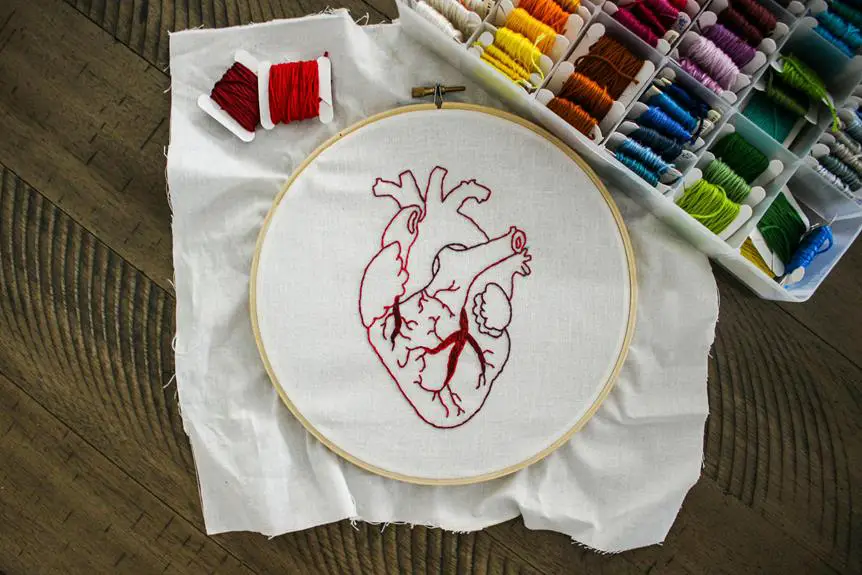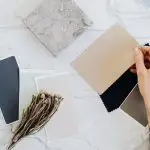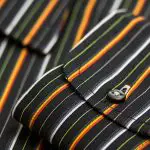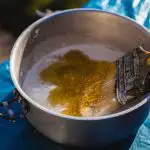When you're tackling fabric projects, selecting the right glue can make all the difference in the outcome. You'll find that different materials require specific adhesives to ensure strong and lasting bonds. For instance, if you're working with cotton, you'll want to consider options like Aleene's Original Tacky Glue, while denim needs a different approach. But what about leather or synthetic fabrics? The choice can be crucial for durability and appearance. Let's explore which glues will best suit your materials and why using the right one matters so much.
Table of Contents
Key Takeaways
- Water-based fabric glues are ideal for lighter fabrics and temporary projects, offering easy cleanup and repositioning before setting.
- Solvent-based glues provide a strong bond for heavy-duty applications, making them suitable for thicker materials and outdoor projects.
- Specialty fabric adhesives are designed for specific materials, such as leather or denim, ensuring optimal adhesion without damaging the fabric.
- Hot glue offers fast application and an instant bond, but caution is needed with delicate fabrics due to potential heat damage.
Types of Fabric Glue
When you're choosing fabric glue, it's essential to understand the different types available, as each serves a unique purpose. Fabric glue generally falls into several categories, including water-based, solvent-based, and hot glue.
Water-based fabric glues are typically easy to clean up and non-toxic, making them great for lighter fabrics and temporary projects. You'll find these glues ideal for quick fixes or when you need to reposition elements before they set.
Solvent-based glues, on the other hand, offer a stronger bond and are more suitable for heavy-duty applications. If you're working with thicker materials or outdoor projects, this type might be your best bet.
Hot glue is another option; it works fast and provides an instant bond. However, be cautious, as the heat can damage delicate fabrics.
Lastly, you may encounter specialty fabric adhesives designed for specific materials, such as leather or denim. Knowing what each glue type offers helps you make informed choices and ensures your projects turn out just the way you envisioned.
Choose wisely, and your fabric creations will hold up beautifully!
Best Fabric Glues for Cotton
For cotton projects, choosing the right fabric glue can make all the difference in achieving a durable and clean finish. Cotton is a versatile material, and using the correct adhesive ensures your creations hold up over time. Here are some of the best fabric glues specifically for cotton:
| Brand | Features |
|---|---|
| Aleene's Original Tacky Glue | Dries clear, flexible, and is machine washable |
| Fabric Fusion | Strong bond, dries clear, and is non-toxic |
| Beacon Fabri-Tac | Fast-drying, permanent bond, and stays flexible |
| E6000 Craft Adhesive | Industrial-strength, waterproof, and suitable for various fabrics |
| Elmer's Craft Bond | Quick-drying, acid-free, and ideal for light fabrics |
When working with cotton, make sure to apply the glue evenly for the best results. You'll want to avoid excess glue, which can lead to stiffness or clumping. Always read the instructions on the product for optimal bonding techniques. With the right fabric glue, your cotton projects will turn out beautifully and withstand wear and tear!
Best Fabric Glues for Denim
Choosing the right fabric glue is essential for achieving strong and lasting bonds on denim projects. Denim's heavy weight and texture require a glue that can withstand stress and maintain flexibility. Look for a fabric glue specifically designed for heavy fabrics, as it'll provide the durability you need.
One of the top choices is a clear, washable fabric adhesive that cures to a flexible finish. This type ensures your denim retains its shape while allowing for movement.
If you're working on a project that needs immediate hold, a fabric glue with a quick-drying formula is ideal. It'll save you time and keep your project on track.
For repairs or embellishments, consider a fabric glue with a strong bond that's also resistant to washing and drying. This will ensure your hard work lasts through multiple wears.
If you're looking for versatility, opt for a fabric glue that can also be used on other materials, allowing you to expand your projects in the future.
Always remember to test the glue on a small area first, ensuring it adheres well without damaging the fabric.
With the right choice, your denim projects will stand the test of time.
Best Fabric Glues for Leather
Finding the right fabric glue for leather can make all the difference in achieving a strong, lasting bond in your projects. When working with leather, you need adhesives that can withstand the unique properties of the material, such as its flexibility and thickness.
One of the top choices is contact cement. It's perfect for leather because it provides an extremely strong hold. Just remember to apply it to both surfaces, let it set for a few minutes, and then press them together for a secure bond.
Another great option is water-based polyurethane glue, which is flexible and dries clear, making it ideal for visible seams.
If you're looking for something easy to use, fabric glue sticks can also work well for leather, especially for lighter projects. They're convenient and mess-free, but be sure to check if they're designed specifically for leather.
For heavy-duty projects, epoxy adhesives are your best bet as they offer unparalleled strength but take longer to cure.
Ultimately, choosing the right glue depends on your specific leather project, so consider the type of leather and the stress it will endure before making your decision.
Best Fabric Glues for Synthetic Fabrics
When working with synthetic fabrics, selecting the right adhesive is crucial to ensure a strong, durable bond that withstands wear and tear. Synthetic materials like polyester, nylon, and spandex can be tricky, but a few fabric glues excel in bonding them effectively.
One popular option is Fabric Fusion, which is a clear, washable adhesive perfect for lightweight synthetic fabrics. It dries flexible, ensuring your projects remain comfortable.
Another great choice is E6000 Craft Adhesive. This industrial-strength glue offers a strong hold and is ideal for heavier synthetic materials or items that require extra durability.
If you're looking for a quick-drying option, Aleene's Original Tacky Glue is a fantastic pick. It's versatile and works well for both light and medium-weight synthetic fabrics. Just remember to apply it sparingly to avoid stiffness.
Lastly, for a no-sew solution, consider using heat-activated fabric tape. This tape adheres well to synthetic materials when heat is applied, making it a great alternative for hemming and bonding without stitching.
With these adhesives, you'll achieve solid results in your synthetic fabric projects.
Frequently Asked Questions
Can Fabric Glue Be Used for Outdoor Projects?
Yes, fabric glue can be used for outdoor projects, but you'll need to choose a waterproof or weather-resistant adhesive. Always check the product specifications to ensure it withstands the elements for your specific needs.
How Long Does Fabric Glue Take to Dry?
Fabric glue typically takes about 24 hours to fully dry, but it can set within a few hours. For best results, check the manufacturer's instructions, and ensure your project's pressure and temperature are optimal.
Is Fabric Glue Washable After Drying?
Yes, fabric glue can be washable after drying, but it depends on the specific product you've used. Always check the manufacturer's instructions to ensure it's suitable for washing to maintain your project's integrity.
Can I Use Fabric Glue on Paper Crafts?
Yes, you can use fabric glue on paper crafts! It adheres well, providing a strong bond. Just ensure the glue's suitable for paper, and always test on a small area first to avoid any mishaps.
How Do I Remove Fabric Glue Stains?
To remove fabric glue stains, gently scrape off excess glue, then apply warm, soapy water or rubbing alcohol. Blot the area with a clean cloth, rinse, and repeat until the stain disappears.
- What Makes Nonwoven Fabric So Cost-Effective? - July 11, 2025
- Nonwoven Vs Woven Bags: an In-Depth Comparison - July 11, 2025
- Which Wax Strips Are Better: Woven or Nonwoven? - July 11, 2025






